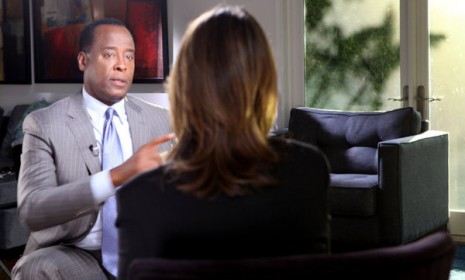Conrad Murray's Today show interview: 6 takeaways
The doctor claims he was not responsible for Michael Jackson's death in an interview taped mere days before Murray was convicted of involuntary manslaughter

A free daily email with the biggest news stories of the day – and the best features from TheWeek.com
You are now subscribed
Your newsletter sign-up was successful
On Thursday, the Today show aired the first segment of a two-part interview with Conrad Murray, the personal doctor of Michael Jackson who was convicted Tuesday of involuntary manslaughter in the 2009 death of the legendary pop singer. (Watch the video below.) Prosecutors argued that Murray was grossly negligent in administering an anesthetic called propofol to help Jackson sleep. A fatal dose of the drug was ruled to be the main factor in Jackson's death at age 50. The interview, conducted by NBC's Savannah Guthrie, was reportedly shot on Oct. 30, before the verdict was handed out. Part two will air Friday morning on Today, while MSNBC will air a full documentary, Michael Jackson and the Doctor, Friday night. Here, six revelations so far:
1. Murray says he wasn't aware of Jackson's addiction
Murray insists that Jackson was using propofol before the doctor even met the pop star. Murray simultaneously claims that he was unaware that Jackson had an addiction to the drug. "Certainly [Jackson] was deceptive by not sharing with me his whole medical history," Murray says. The doctor does concede that "propofol is not recommended to be given in the home setting."
The Week
Escape your echo chamber. Get the facts behind the news, plus analysis from multiple perspectives.

Sign up for The Week's Free Newsletters
From our morning news briefing to a weekly Good News Newsletter, get the best of The Week delivered directly to your inbox.
From our morning news briefing to a weekly Good News Newsletter, get the best of The Week delivered directly to your inbox.
2. He didn't raise the alarm about the drug because the dose was "inconsequential"
Murray admits he gave Jackson a small dose of propofol the night the singer died, but didn't think he needed to monitor Jackson because it was such a tiny amount. As to why he didn't mention the drug to paramedics when they arrived on the scene? "It was inconsequential." When asked why he told paramedics about other drugs but not the propofol, Murray says, "Because it had no effect. It was not an issue." Murray's failure to monitor Jackson after administering the drug, or to tell paramedics about the drug, were two key arguments in the prosecution's case.
3. Murray says he left the room to avoid waking Jackson up
According to police reports, which Murray corroborates, he was not in the room when Jackson died — a grossly negligent act, prosecutors argued. In his defense, Murray tells Guthrie, "When I looked at a man who was all night deprived of sleep, who was desperate for sleep and finally is getting some sleep, am I gonna sit over him, sit around him, tug on his feet, do anything unusual to wake him up? No."
A free daily email with the biggest news stories of the day – and the best features from TheWeek.com
4. He thinks Jackson self-administered the fatal dose
Murray's defense throughout the trial was that Jackson gave himself the fatal dose of propofol while Murray was not in the room. When asked about that defense in the interview, Murray answers with a "coy smile," says Lanford Beard at Entertainment Weekly. "What do you think?" Murray says. "Something happened when I was not in that room." He adds: "Nothing that I gave Michael should have ended his life."
5. Murray and Jackson were apparently pals
Throughout the interview, Murray "portrays himself as a helper to the reclusive Jackson," says Beard. "A life coach of sorts," who encouraged the singer to do a varietiy of things from cleaning his room to expressing his emotions. "I told him, 'It's okay to cry, Michael. It's okay.'" In the interview, Murray says Jackson referred to him as his "one friend."
6. Jackson's estate is not happy
The co-executors of Jackson's estate sent a "blistering letter" to NBC and MSNBC, "attacking the networks' ethics" for granting Murray a platform to defend himself, says TMZ, which obtained the letter. By claiming that the documentary and interview are legal because the footage was shot before Murray was convicted, the letter reads, the networks are using "loopholes… in order to boost ratings at a struggling cable network [MSNBC]."
Sources: AP, Entertainment Weekly, Hollywood Reporter, Reuters, LA Times (2), TMZ
Visit msnbc.com for breaking news, world news, and news about the economy
-
 How the FCC’s ‘equal time’ rule works
How the FCC’s ‘equal time’ rule worksIn the Spotlight The law is at the heart of the Colbert-CBS conflict
-
 What is the endgame in the DHS shutdown?
What is the endgame in the DHS shutdown?Today’s Big Question Democrats want to rein in ICE’s immigration crackdown
-
 ‘Poor time management isn’t just an inconvenience’
‘Poor time management isn’t just an inconvenience’Instant Opinion Opinion, comment and editorials of the day